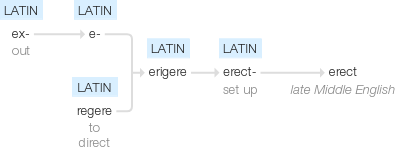Erect
late Middle English: from Latin erect- ‘set up’, from the verb erigere, from e- (variant of ex- ) ‘out’ + regere ‘to direct’.
wiktionary
From Middle English erect, a borrowing from Latin ērectus(“upright”), past participle of ērigō(“raise, set up”), from ē-(“out”) + regō(“to direct, keep straight, guide”).
From Middle English erecten, from the adjective (see above).
etymonline
erect (adj.)
late 14c., "upright, not bending," from Latin erectus "upright, elevated, lofty; eager, alert, aroused; resolute; arrogant," past participle of erigere "raise or set up," from e- "up, out of" + regere "to direct, keep straight, guide" (from PIE root *reg- "move in a straight line," with derivatives meaning "to direct in a straight line," thus "to lead, rule").
erect (v.)
c. 1400, a back-formation from erect (adj.) or else from Latin erectus. Related: Erected; erecting.
